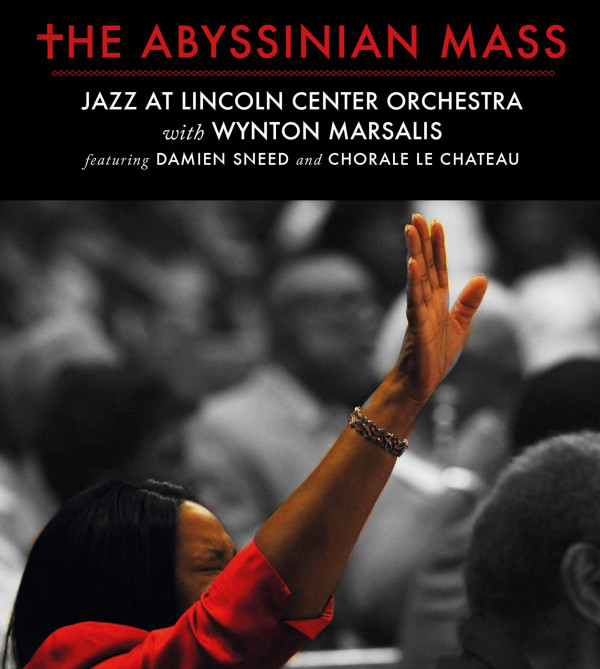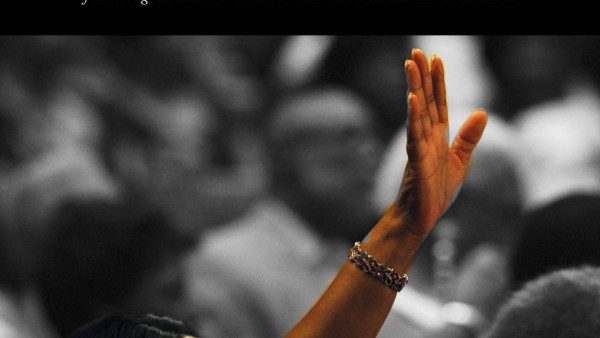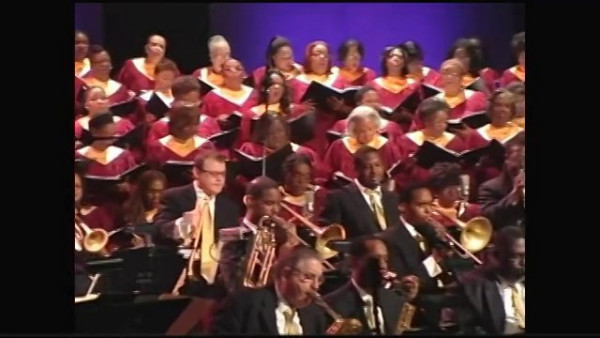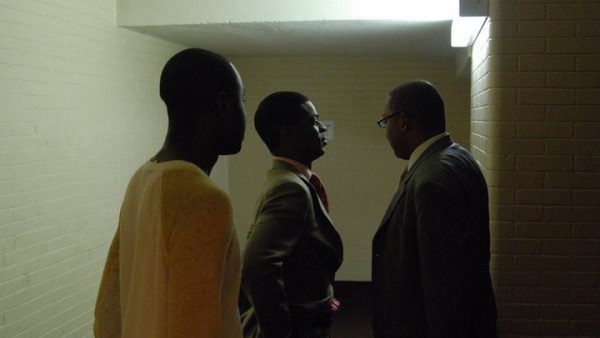Marsalis Leads The Faithful
This past weekend, to celebrate the 200th anniversary of the Abyssinian Baptist Church, which is generally regarded as New York’s oldest Afro-American religious institution, Jazz at Lincoln Center’s Rose Hall was transformed into a kind of spiritual multiplex. Gospel choirs issued forth from every performance space, and also in the public atrium in between (where macaroni and cheese was served, presumably to evoke the provisions one might find at a Sunday school picnic). What artistic director Wynton Marsalis usually calls the House of Swing had become the House of Prayer.
The main event was “Abyssinian 200: A Celebration” — a new work composed by Mr. Marsalis for the Jazz at Lincoln Center Orchestra and the 100-voice Abyssinian Baptist Choir — which was performed in the Frederick P. Rose Hall. Note for note, Mr. Marsalis may well be history’s most prolific composer of extended works in the jazz idiom; he not only writes them more frequently than most (roughly one every two years or so), but they are typically longer than anyone else’s. Generally speaking, several rules consistently apply to these extended pieces: Early on, in his 30s, Mr. Marsalis had a tendency to leave his influences undigested (as Gary Giddins put it), inserting passages that sounded literally like Duke Ellington had come back to Earth to write them. They also tended to be way too long.
Conversely, Mr. Marsalis’s more recent full-length works show steady signs of improvement: He is developing a more consistently distinctive voice as a composer, and is mastering the craft of judicious editing (several segments of the new work, listed in the program, were not performed, presumably to keep the evening under two hours). He also produces outstanding results when given a special instrumental and/or conceptual impetus, as he did on the 2006 “Congo Square,” which combined the JaLCO with an African percussion ensemble, and on the new “Abyssinian 200,” which will be reprised at the Abyssinian Baptist Church on Saturday.
On all these levels, the idea of an extra-length spiritual work is a blessing for Mr. Marsalis. The choir gives him a special inspiration, and lends the work a new dimension musically and contextually. Also important: In a religious work, there’s no necessity to be 100% original just for the sake of it. As composers from Bach to Ellington to Bernstein learned, it’s acceptable to include settings of traditional and existing material. The idea is to express your devotion to God, not just to show off how fancily you can write. This Mr. Marsalis does very well.
The composer has incorporated church elements into his music at least as far back as Stanley Crouch’s mock-sermon in 1988’s “The Majesty of the Blues.” Since then, there was “In This House, On This Morning” (1994), a service for septet, as well as the fully symphonic “All Rise” (2001). “Abyssinian 200,” for jazz big band and choir, is by far the most enjoyable of the three, not least because of the secret weapon deployed: the right Rev. Calvin Butts III, pastor of the Abyssinian Baptist Church, who, at the climax of the piece, delivered unto us a powerful sermon on the potential of prayer to unite mankind. Rev. Butts was at times accompanied by music. More inclusive than exclusive, he made references to all the major religions, and even included the complete “Serenity Prayer” for the benefit of the 12-steppers in the house. Representing a different kind of stepper, the dancer Jared Grimes tapped brilliantly on “Doxology,” in the tradition of Ellington’s use of tap dance on “David Danced.”
Mr. Marsalis’s basic musical reference point is the sacred canon of Duke Ellington, yet “Abyssinian 200” could almost be viewed as a reflection on history of the religious influence in jazz: “Prayer” brought to mind a turn-of-the-century New Orleans brass band playing “Gloryland” in 2/4 time, while the final “Amen” suggested the meditatively modal moments of John Coltrane’s “A Love Supreme.”
Other points of reference were a beautiful reed section feature, obviously inspired by Benny Carter in “Invocation.” Mr. Marsalis also invoked his own trademarks, namely the use of tambourines and hand claps to emphasize and extend the rhythm, while “Recessional” drew from a locomotive model similar to his 1999 “Big Train,” with the expanded palette of the choir, singing of the Glory Train. He also made frequent use, especially in the early movements, of call-and-response between the choir and individual soloists, particularly the trombones (Vincent Gardner and Elliot Mason soloed most frequently). “Meditations” used an ingenious combination of four clarinets backing a melody solo by the bassist Carlos Henriquez; two other soloists who distinguished themselves in various contexts were the highly animated trumpeter Sean Jones and the soulful alto saxophonist Sherman Irby. They were consistently moved by the Spirit throughout the evening.
The Abyssinian Church’s most famous leader was the late Adam Clayton Powell Jr., a charismatic pastor who was also a congressman. Both of Powell’s successors were present on Friday — the Rev. Butts and Rep. Charles Rangel. The separation of church and state is a fundamental precept of American democracy, but thank God (or whoever) there’s no law separating the church and music. Meanwhile, the pianist Eric Reed, performing in the Allen Room in collaboration with the celebrated gospel singer Edwin Hawkins, began with an audio clip of Mr. Hawkins and his choir singing “Footprints of Jesus.” This segued into Mr. Reed and his trio playing live; but instead of playing that melody, as the audience expected, they instead launched into a fast, boppish version of “Autumn Leaves,” which turned out to have the same chord changes. Mr. Reed’s well-focused ambition was to illustrate the diverse and complex relationship between religious and vernacular music in black America — how Ray Charles, for instance, transmuted gospel into R&B in the late ’50s and how Mr. Hawkins, a decade later, took the secular soul of Motown and injected it with a new spirituality.
The main order of business for the evening was to present the familiar contemporary gospel numbers of Mr. Hawkins, such as “He Will Never Leave You” and “The Comforter Will Come.” For the novice, these sound nothing like the rough-hewn, old-school gospel of Mahalia Jackson or Thomas A. Dorsey; these numbers are slick and smooth enough to be played on any 21st-century urban pop station, except for their religious libretti. Mr. Reed — working with Ben Williams on bass, Willie Jones III on drums, and Stacy Dillard on soprano saxophone — soloed only occasionally, but was mostly happy to defer to his iconic guest, who was backed by his son, the organist Lawrence Johnson, and three backup singers.
The finale, as we knew from the beginning, was predestined to be Mr. Hawkins’s 1968 chart hit “Oh Happy Day.” But the most surprisingly moving moment had already happened. After Mr. Hawkins intoned “God Is Calling You” with a smooth croon, rather like a spiritual Herb Jeffries, he got even more secular by singing two “lay” standards, “My Funny Valentine” (introduced by a Bach-like treatment of the verse by Mr. Reed) and “Somewhere.” The Bernstein song was nearly inspirational enough to bring on the Rapture all by itself; Mr. Hawkins made it into a Broadway version of “I Know a City Called Heaven.” Dozens of church ladies in the Allen Room swooned their approval, and that’s something you don’t get in “West Side Story.”
by Will Friedwald
Source: New York Sun




